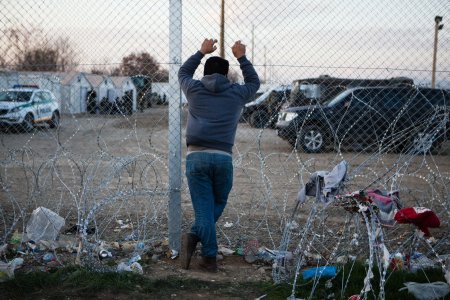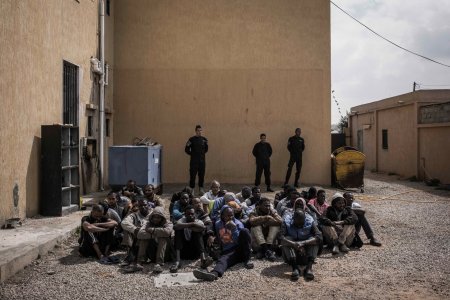
Sea Search and Rescue Operations Outlawed
Michaël Neuman & Mego Terzian

Director of studies at Crash / Médecins sans Frontières, Michaël Neuman graduated in Contemporary History and International Relations (University Paris-I). He joined Médecins sans Frontières in 1999 and has worked both on the ground (Balkans, Sudan, Caucasus, West Africa) and in headquarters (New York, Paris as deputy director responsible for programmes). He has also carried out research on issues of immigration and geopolitics. He is co-editor of "Humanitarian negotiations Revealed, the MSF experience" (London: Hurst and Co, 2011). He is also the co-editor of "Saving lives and staying alive. Humanitarian Security in the Age of Risk Management" (London: Hurst and Co, 2016).
Mégo Terzian est médecin pédiatre, ancien responsable des urgences et président de Médecins Sans Frontières depuis 2013.
Opinion piece in Le Monde, 07 December 2018.
Judicial, bureaucratic and political campaigns against search and rescue in the Mediterranean Sea have eventually forced the Aquarius, the rescue ship chartered with MSF’s partner SOS Méditerranée patrolling from 2016 to 2018, to stop its activities.
In 2014, the Italian authorities set up Operation Mare Nostrum, heralding a period during which rescuing boats carrying migrants in distress was considered legitimate. What was first and foremost a legal obligation had gained political and public acceptance.
Then, in 2018, Italy thrust itself to the forefront once again, but this time to declare it considered the rescue operations no longer acceptable. At the beginning of the summer, newly appointed Interior Minister Matteo Salvini turned his attention to closing Italy’s ports to search and rescue ships. Pushing forward a policy of deterrence already well advanced by his predecessor Marco Minniti, Salvini finally succeeded in winding up all means and resources intended for rescuing people escaping from Libya.
Surely, civil society organisations, such as Sea Watch, Mare Jonio and Proactiva Open Arms are still doing what they can to maintain, in a remarkable show of perseverance, their sea search and rescue operations. Voluntary pilots from Moonbird and Colibri continue their reconnaissance flights to spot boats adrift in the waves and prevent the long list of deaths—over 17,000 since 2014—from becoming even longer. But all these organisations have enormous problems to contend with: interminable red tape, obstacles imposed on their technical stop-overs, bans on docking in Europe and even prosecution, as is the case of the Aquarius. Already stripped of its flag after pressure from Italy, the vessel is now under threat of seizure because of the outrageous accusations of organised crime that have been levelled against it—yet again the work of Italy. Some of its crew and MSF team members have been implicated and their rescue work criminalised. It is patently obvious that the sea search and rescue effort we, sometimes in partnership with other organisations, have taken part in on five different ships since 2015 is now outlawed.
The victims of this uneven contest are undoubtedly asylum seekers, refugees, and migrants—for whom hardly anyone appear to care little. Indeed, how many victims have there been? With nobody to bear witness at sea, nobody knows. Meanwhile, the trap Libya has become is closing, a trap undoubtedly maintained by diverse Libyan authorities, but whose workings are most definitely the product of European creativity.
Thousands of people are condemned to trying to survive the tangled web of Libya’s official detention centres and clandestine prisons. We strongly recommend our decision-makers visit these places of detention so that they can get some sense of what the future holds for their fellow human beings. Many other migrants and refugees, ensnared in the tight net of a state-of-the-art military-technical system, die sooner as they try to make their way from Africa’s vast sub-Sahelian region.
Europe's absence
There’s a lot of talk of Italy, but the unanimity shown by Europe in the face of this deadly spiral is just as significant. Neither France nor Spain, or any other country or European institution, has voiced any real objection to the carving up of Europe’s external border management policy by leaders employing racist and violent methods. This is hardly surprising, given that the stratagem was set in motion some time ago.
So, there’s almost no one willing to offer shelter to a few hundred people who, by an incredible stroke of luck, were able to benefit in a few places from the United Nations High Commissioner for Refugees’ relocation programme. Turning back the unwanted at Europe’s frontiers has long been official, including between France and Italy or in the case of the 15,000 people left to fall through the cracks in appalling conditions on the Greek islands—a sordid backcloth to what was playing out on European borders.
Spanish fishing boat the Nuestra Madre de Loreto is the most recent symbol. Stranded out at sea for over a week after going to the rescue of 12 people, the trawler was refused permission to disembark them in European ports—including Spain’s. Spain had previously been a role model for taking in people rescued at sea, but during this incident, its government has been advocating for survivors to be returned to Libya’s prisons. It was only when the captain had decided, in spite of everything, to set course for Spain that the trawler received authorisation to transfer the survivors it had rescued to Malta.
A general failure to assist
A far more ominous period is looming on the horizon. At the same time as the delegating of sea search and rescue operations to Libya’s coastguard, failure to assist people in distress in the Mediterranean has is becoming increasingly common. We all remember 2011 when, right in the middle of western military intervention in Libya, dozens of migrants drowned after drifting at sea for several days—in spite of the flights and reconnaissance deployed by numerous NATO planes and ships. The failure to assist has made a comeback. Merchant ships concerned they won’t know where they will be able to disembark people they rescue alter their usual routes or change course at the sight of a boat they would really prefer not to see. This is what our teams providing assistance in Libya heard from survivors rescued by the Nivin, a container ship whose story depicts only too well the extent of the cowardice of European political leaders and international agencies, who had all asserted at some point that the rescued migrants would be not be sent back to Libya against their will.
But that’s exactly what happened with the Nivin when the 95 survivors on board refused to disembark in the port of Misrata, situated east of Tripoli. For ten days, our teams provided medical assistance to those preferring to remain on the ship and were able to see no serious consideration was given to seeking an alternative to their return to detention. Libyan forces then stormed the ship to force the disembarkation. A dozen people were wounded, some seriously, and several of those involved now face prosecution in Libya for piracy.
Insanity, torture, death—these are the alternatives for refugees and migrants in Libya. And as for merchant sailors, they have a choice between not honouring their obligations and suffering persecution at European hands. As countries on both sides of the Mediterranean give themselves the power to exercise the right of life and death over people whose only motivation is the quest for a better life, we will not stop rescuing people where we are still able to do it, supporting sea search and rescue operations and contributing to renewing the model. Spectators and lucid participants, we will not refrain from challenging these rationales of sacrifice.
 Alex Yallop/MSF
Dossier
Alex Yallop/MSF
Dossier
Migrants / refugees
05/29/2018 Elba RahmouniWith the cold war over, refugees have lost their status as an instrument of western soft power, whereas with the economic crisis and terrorism, hostility towards migrants is increasing. Prevailing representations of migration movements are convincing a growing proportion of the European population that migrants are a threat and refugees a burden. This file contains a collection of publications (articles, opinion columns, blog articles, press releases, CRASH papers) from 1990 to date, focusing on two themes : 1° the dichotomy between hospitality policy and migration policy, 2° camps approached from a number of different angles.
NGOs are not in collusion with smugglers
07/10/2018 Michaël Neuman Thierry Allafort-DuvergerHumanitarian aid organisations carrying out rescues at sea were made into the accomplices of human traffickers. This accusation is as absurd as it is unacceptable. Not only do rescue operations at sea save people from drowning, but they evacuate people in situations of immediate danger in Libya, MSF recalls.
 Guillaume Binet/Myop
Op-ed
Guillaume Binet/Myop
Op-ed
The state: from sieve to smuggler
09/10/2018 Jean-Hervé BradolNumerous politicians, from Daniel Cohn-Bendit to Marine Le Pen and including Emmanuel Macron, denounce what they claim is collusion between organisations helping migrants (humanitarian workers) and smugglers (criminals). One group operates in full public view, the other out of sight, but both are said to be working together to help people illegally cross borders.
To cite this content :
Michaël Neuman, Mego Terzian, “Sea Search and Rescue Operations Outlawed”, 12 décembre 2018, URL : https://msf-crash.org/en/camps-refugees-idps/sea-search-and-rescue-operations-outlawed
If you would like to comment on this article, you can find us on social media or contact us here:
ContributePériode
Newsletter
Subscribe to our newsletter to stay informed about our latest publications. Interested in a specific author or thematic? Subscribe to our email alerts.
